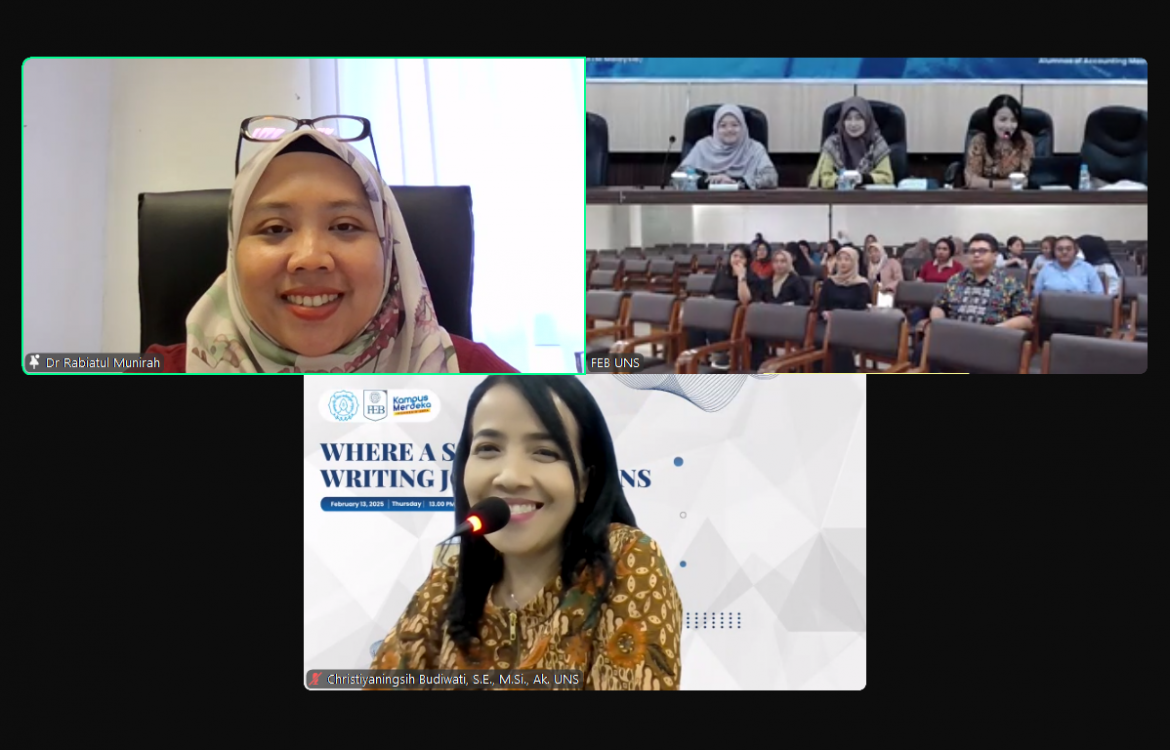
Hosting a Hybrid Webinar “Where a Scientific Writing Journey Begins,” MAKSI FEB UNS Welcomes New Students
The Master of Accounting Study Program (MAKSI), Faculty of Economics and Business, Universitas Sebelas Maret (FEB UNS), hosted a hybrid webinar on Thursday, February 13, 2025, as part of its orientation program for new students. The event took place in the Konimex Hall, Bachtiar Effendi Building, FEB UNS, and was also available virtually via Zoom Cloud Meeting.
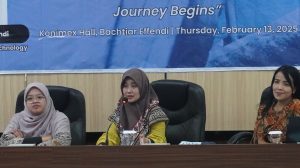 The two speakers featured in the webinar were Dr. Rabiatul Munirah Alpandi from Universiti Teknologi MARA (UiTM), Malaysia, and Nadifa Salsabila Nizar, S.Ak., M.Ak., a MAKSI FEB UNS alumnae who currently serves as Director of General Affairs and Finance at RS Ortopedi Siaga Utama.
The two speakers featured in the webinar were Dr. Rabiatul Munirah Alpandi from Universiti Teknologi MARA (UiTM), Malaysia, and Nadifa Salsabila Nizar, S.Ak., M.Ak., a MAKSI FEB UNS alumnae who currently serves as Director of General Affairs and Finance at RS Ortopedi Siaga Utama.
The event commenced with a prayer and the Indonesian national anthem. The webinar was officially opened with remarks from the Head of the MAKSI Program, Lulus Kurniasih, S.E., M.S.Ak., Ph.D., who extended her appreciation and conveyed her hopes for the session. “I hope today’s discussion provides valuable insight for the new MAKSI students. As we know, MAKSI students are required to conduct research and publish their findings. Therefore, today’s speakers will share their knowledge on how to carry out proper research and how to get published,” explained Lulus Kurniasih, S.E., M.S.Ak., Ph.D.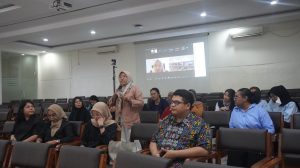
Dr. Rabiatul Munirah Alpandi opened her presentation by explaining that graduate students differ from undergraduates in terms of academic focus. At the graduate level, students are expected to explore a specific topic in greater depth. “You need to determine the subject or field you wish to specialize in. As undergraduate student, we learn the foundational elements of accounting, which involves many courses. However, in a master’s program, the focus narrows to a specific field, leading to in-depth research. Therefore, having a clear objective is essential,” stated Dr. Rabiatul.
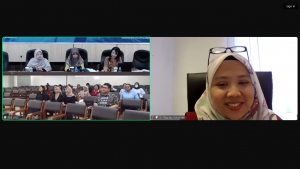 Regarding the research and publication process, she highlighted the importance of identifying a problem to solve, once the student has determined their field of interest. Such problems can often be discovered through literature reviews. This process helps formulate the problem statement and identify research gaps from previous studies. Based on that, students can then define the purpose of their research and its contribution.
Regarding the research and publication process, she highlighted the importance of identifying a problem to solve, once the student has determined their field of interest. Such problems can often be discovered through literature reviews. This process helps formulate the problem statement and identify research gaps from previous studies. Based on that, students can then define the purpose of their research and its contribution.
Furthermore, according to Dr. Rabiatul, it is also important to understanding data availability. Without accessible data, students may face challenges in data collection and analysis. Research methodology is also a critical component, as it determines how students approach and resolve the identified problem in pursuit of their research objectives.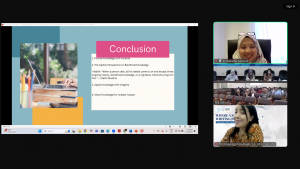
“You must collect and process data ethically. If your results turn out to be statistically insignificant, simply explain them clearly and provide justification. Avoid manipulating data just to obtain significant results,” she emphasized.
Toward the end of her presentation, Dr. Rabiatul discussed the use of AI in the publication process. “AI can facilitate research and publication efforts, but we must use it wisely and cautiously. Ultimately, during your thesis defense, it will be you who must respond to the examiners’ questions. As practice, try to write daily—even just two paragraphs. It’s fine to take breaks, but be careful not to do it for too long, as it may become difficult to start again,” she concluded.
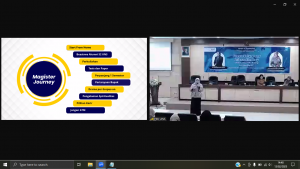 In contrast to Dr. Rabiatul’s theoretical presentation, the second speaker, Nadifa Salsabila Nizar, S.Ak., M.Ak., shared her personal academic journey during her time in the MAKSI program. She described the beginning of her studies, her successful application for the alumni scholarship, and the challenges she faced during the publication process, which eventually led her to extend her period of study. Alongside her story, Nadifa offered motivation and advice to current students of the program.
In contrast to Dr. Rabiatul’s theoretical presentation, the second speaker, Nadifa Salsabila Nizar, S.Ak., M.Ak., shared her personal academic journey during her time in the MAKSI program. She described the beginning of her studies, her successful application for the alumni scholarship, and the challenges she faced during the publication process, which eventually led her to extend her period of study. Alongside her story, Nadifa offered motivation and advice to current students of the program.
“We must remember our initial reasons or motivations for pursuing a master’s degree. This is particularly important when we begin to question whether we should continue or stop. If needed, take a short break—but do not entirely lose contact with your academic advisor,” said Nadifa.
In addition to the presentations, participants were given the opportunity to ask questions directly to the speakers, with each student who posed a question receiving a gift. The event concluded with a group photo session.

